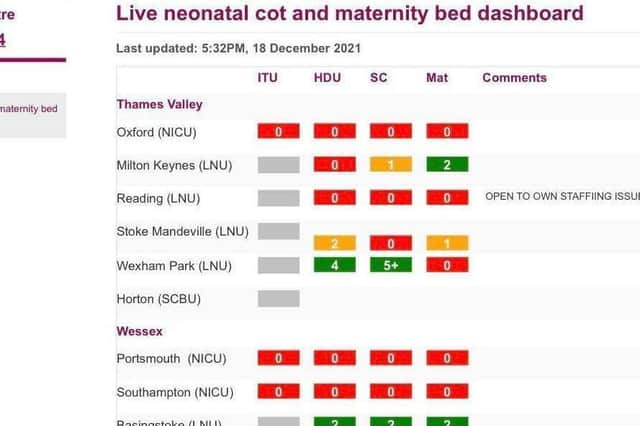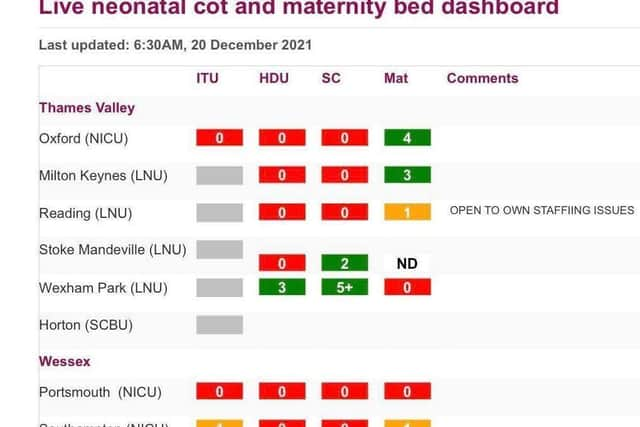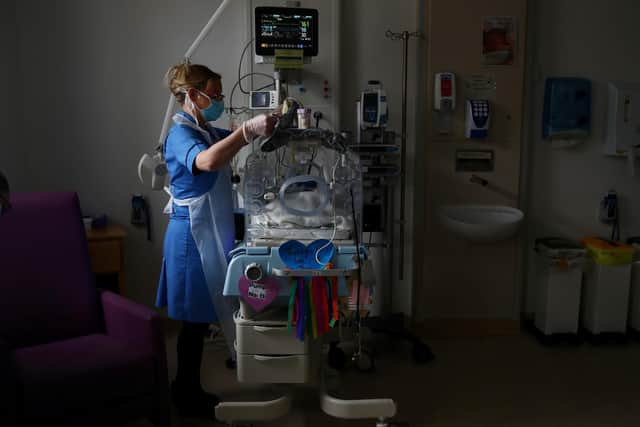'Russian roulette' in intensive care for newborn babies and intolerable pressure on maternity units must not become the 'new normal' say Banbury campaigners


Keep the Horton General (KTHG) campaign group says frequent red alerts in maternity services - at Oxford and across the region - must not become the 'new normal'. Meanwhile the Oxford University Hospitals NHS Trust admits that cot capacity is a source of pressure but says it is ready to welcome ten new neo-natal nurses in the New Year.
KTHG keeps a watch on a daily 'live maternity dashboard' that has shown a worrying lack of specialist beds for very premature babies, those needing surgery soon after birth and other very sick infants. Even maternity beds appear to be in very short supply.
Advertisement
Hide AdAdvertisement
Hide AdKTHG maternity spokeswoman Sophie Hammond said: "KTHG has been monitoring the Southampton-Oxford Live Neonatal Cot and Maternity Bed Dashboard for the past six weeks.


"We're very concerned at what we're seeing, which is both emergency provision for sick newborns and maternity beds almost constantly at capacity across Oxfordshire.
"On several occasions this has been accompanied by a lack of neonatal cots stretching from Milton Keynes to the Isle of Wight. While staffing issues translate into daily bed shortages and frequent 'red alerts', an overstretched service provision must not be allowed to become the 'new normal'.
"We've already witnessed a preventable tragedy arising from this sort of scenario, where a labouring mother whose baby was in distress could not be transferred to the John Radcliffe, owing to a lack of capacity. The child was consequently born deaf, blind and unable to swallow," she said.
Advertisement
Hide AdAdvertisement
Hide Ad"When the system is constantly at capacity because of staffing issues resulting from illness, burn-out, and shift working patterns which are incompatible with family life hospital trusts are forcing on mothers and babies a worrying Russian roulette of care, and this is simply not acceptable.


"We're one of the richest countries in the world, yet the safety of mothers and babies is being compromised, patient choice is being eroded and standards of care are slipping because not nearly enough is being done to address staff retention problems."
KTHG has continued to campaign for a return of full maternity services to the Horton General Hospital in Banbury - removed in 2016 - saying as well as providing truly local care, it provided a safety net for the JR.
The OUH said cot capacity is one of the main sources of pressure. The unit is often 'very full' and sometimes all cots have babies in them. The additional problem of Covid infections has not helped.
Advertisement
Hide AdAdvertisement
Hide AdDuring the pandemic, the trust's priority has been to follow national guidance when dealing with Covid-19, whether it is staff or patients who may be unwell.


A spokesperson said: “High-quality maternity and neonatal care is of paramount importance and patient and staff safety have continued to remain the priority throughout the pandemic.
“We provide specialist medical and surgical care for babies across the Thames Valley Neonatal Network and we are able to transfer babies widely and work closely with health partners when we need to, in order to ensure the best possible patient care.
"In terms of neonates, one of the main sources of pressure is cot capacity – we are often very full and sometimes all of our cots have babies in them.
Advertisement
Hide AdAdvertisement
Hide Ad"Our recruitment programme for the Neonatal Unit is progressing well and we are expecting ten nurses to start in the new year.
"At times, we have temporarily reduced services for women outside Oxfordshire whose babies might need to be cared for on the unit. This was to ensure the provision of safe patient care to those babies already on the ward.
"On the rare occasion this happens, we work with our partners across the health service to locate a suitable location for the patients to be looked after and make sure they receive the appropriate care. We’d like to reassure people that the level of patient care is not impacted at this time."
The trust urges pregnant women to have their Covid-19 vaccinations if they have not already done so. "It is one of the best ways to keep themselves, their babies and those around them safe," the spokesman said.